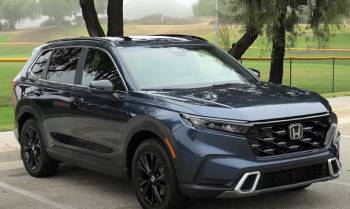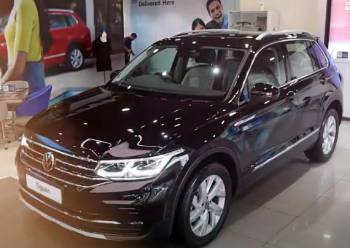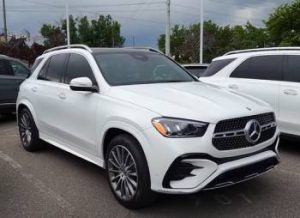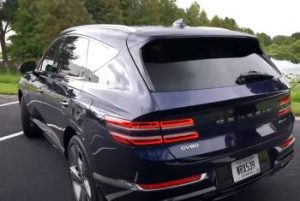The compact SUV market is hotter than ever, and today we’re diving into an epic showdown: Honda CR-V vs VW Tiguan. If you’re shopping for a new SUV, you’ve probably considered one of these big players. Both cars have earned their spots on many “best of” lists, but which one truly deserves your hard-earned cash?
Strap in for an ultimate face-off as we unpack the pros and cons of each, comparing key features like performance, comfort, and safety.
A Brief Comparison Table
| Feature Category | Honda CR-V | VW Tiguan |
| Engine Performance | 1.5L turbo, 190 HP, 179 lb-ft torque | 2.0L turbo, 184 HP, 221 lb-ft torque |
| Fuel Economy | 28 mpg city / 34 mpg highway | 23 mpg city / 29 mpg highway |
| Interior Space | Up to 75.8 cubic feet of cargo space | Up to 65.7 cubic feet of cargo space |
| Seating Options | No third-row seating | Optional third-row seating |
| Safety Features | Honda Sensing available on most trims | Some features reserved for higher trims |
| Starting Price | Generally lower | Generally higher |
| Value Proposition | More features at a lower cost | More premium features at a higher cost |
The Power Under the Hood: Performance

Honda CR-V
Honda’s reputation for reliable performance shines through in the CR-V. The turbocharged 1.5-liter four-cylinder engine offers a balanced mix of power and efficiency.
The CR-V accelerates smoothly, and the handling is precise. The all-wheel-drive (AWD) option also delivers better traction for those harsh winter months or off-road adventures.
Pros:
- Smooth and responsive acceleration
- Balanced power and efficiency
Cons:
- Limited engine options
- Not as sporty as some may desire
VW Tiguan
The Tiguan, on the other hand, brings a turbocharged 2.0-liter four-cylinder engine to the table. It’s a bit more powerful than the CR-V but can feel somewhat sluggish during rapid acceleration.
The optional 4Motion all-wheel-drive system does offer good traction, but the overall handling isn’t quite as sharp as the CR-V.
Pros:
- More engine power
- Available AWD with 4Motion
Cons:
- Slightly sluggish acceleration
- Not as agile in handling
Also Read: Differences Between General Gmax AS-05 And Michelin Tires.
Your Home on the Road: Interior Comfort

Honda CR-V
The CR-V stands out for its ultra-spacious interior. You’ll find a generous amount of legroom, even in the back seat, and the cargo space is genuinely impressive.
The infotainment system is user-friendly, although not particularly flashy.
Pros:
- Generous legroom and cargo space
- User-friendly infotainment system
Cons:
- Somewhat basic interior finishes
- No optional third-row seating
VW Tiguan
The Tiguan’s interior is a mix of comfort and style. Optional third-row seating sets it apart from the CR-V and makes it a more flexible option for larger families.
Volkswagen’s infotainment system is easy to use and offers Apple CarPlay and Android Auto as standard features.
Pros:
- Stylish and high-quality interior
- Optional third-row seating
Cons:
- Less cargo space compared to the CR-V
- A bit tight on legroom in the third row
Safety First: How They Stack Up
Honda CR-V
Honda doesn’t skimp on safety. The CR-V comes equipped with Honda Sensing, a suite of safety features that includes collision mitigation braking, lane-keeping assist, and adaptive cruise control.
Pros:
- Comprehensive safety features
- Excellent safety ratings
Cons:
- Some advanced features only in higher trims
VW Tiguan
The Tiguan also offers a strong safety package, including automated emergency braking, blind-spot monitoring, and rear cross-traffic alert as standard. However, you’ll have to upgrade to higher trims for adaptive cruise control and lane-keeping assist.
Pros:
- Solid basic safety features
- Good safety ratings
Cons:
- Some safety features reserved for higher trims
- Slightly more expensive safety package
Key Differences Between Honda CR-V and VW Tiguan
When it comes to Honda CR-V and VW Tiguan, they’re both in the same class but cater to different consumer needs. Here, we’re going to deep-dive into some of the critical differences that set them apart.
Engine Performance & Efficiency
- Honda CR-V
The CR-V’s 1.5-liter turbocharged four-cylinder engine offers 190 horsepower and 179 lb-ft of torque. Honda has focused on creating a smooth and fuel-efficient powertrain, making the CR-V one of the leaders in its class in terms of fuel economy. The EPA estimates are around 28 mpg in the city and 34 mpg on the highway.
- VW Tiguan
On the flip side, the Tiguan’s 2.0-liter turbocharged four-cylinder engine cranks out 184 horsepower but a heftier 221 lb-ft of torque. The Tiguan is built more for robust performance rather than fuel efficiency. The Tiguan’s EPA estimates are slightly lower, at approximately 23 mpg in the city and 29 mpg on the highway.
Verdict: If fuel economy is your priority, the Honda CR-V takes the cake. But if you’re after a bit more robust torque and power, the VW Tiguan stands out.
Interior Amenities & Cargo Space
- Honda CR-V
Honda has optimized the CR-V for maximum utility and comfort. The CR-V’s cabin is spacious, and the cargo area offers up to 75.8 cubic feet with the rear seats folded down. That’s ample space for your camping gear or a big grocery haul.
- VW Tiguan
The Tiguan counters with an optional third-row seat, a rarity in this class. However, this addition does compromise cargo space, offering a maximum of 65.7 cubic feet. The Tiguan aims to provide more flexibility with the extra seating but at the cost of storage space.
Verdict: For larger families or those who occasionally need extra seats, the Tiguan’s optional third row can be a godsend. However, if maximizing cargo space is your goal, the CR-V wins hands-down.
Safety Technologies
- Honda CR-V
Honda Sensing, Honda’s suite of safety tech, is available across most trims and standard on the higher ones. Features like collision mitigation braking, road departure mitigation, and adaptive cruise control make the CR-V a leader in the safety department.
- VW Tiguan
The Tiguan also has a respectable safety suite, but some features like adaptive cruise control and lane-keeping assist are only available on higher trims. However, Tiguan does offer standard features like automated emergency braking and blind-spot monitoring.
Verdict: Both vehicles offer solid safety features, but Honda tends to offer them at lower trim levels than VW, making advanced safety tech more accessible to buyers on a budget.
Price & Value
- Honda CR-V
The CR-V starts at a lower base price compared to the Tiguan. While pricing can vary based on trim and options, the CR-V generally offers more features at a lower cost, adding to its overall value proposition.
- VW Tiguan
The Tiguan starts at a slightly higher base price, but it often comes with features like a third-row seat and a more luxurious interior as you climb the trim ladder.
Verdict: If you’re looking for value for money and are content with a well-rounded vehicle, the Honda CR-V is hard to beat. However, if you’re willing to pay a premium for optional seating and a more upscale interior, the VW Tiguan might be worth the extra dollars.
Also Read: Should You Get Costco Tires Or Discount Tire?
FAQs: Frequently Asked Questions
There’s no one-size-fits-all answer. If you’re looking for reliability and spaciousness, the CR-V wins. But if you want a stylish interior with optional third-row seating, the Tiguan is your go-to.
The VW Tiguan often finds itself compared to other compact SUVs like the Toyota RAV4, Ford Escape, and Hyundai Tucson, besides the Honda CR-V.
Yes, the Tiguan is generally considered a reliable car, although it may not match the long-standing reputation of Honda in this department.
The CR-V generally offers better fuel economy, thanks to its efficient 1.5-liter engine. The Tiguan, although powerful, lags slightly in this aspect.
Historically, Honda has had a better reputation for long-term reliability compared to Volkswagen.
The Tiguan’s popularity stems from its stylish interior, optional third-row seating, and a strong suite of standard features, including advanced safety tech.
Conclusion
There you have it! A head-to-head comparison of the Honda CR-V and VW Tiguan. Both are solid choices, but your decision should ultimately depend on what features matter most to you. Happy shopping!
The Honda CR-V and VW Tiguan each have their unique sets of pros and cons, and the best choice really depends on what you’re looking for in a compact SUV. Whether it’s fuel efficiency, cargo space, safety features, or value for money, both vehicles have a lot to offer but in different ways. Choose wisely!



